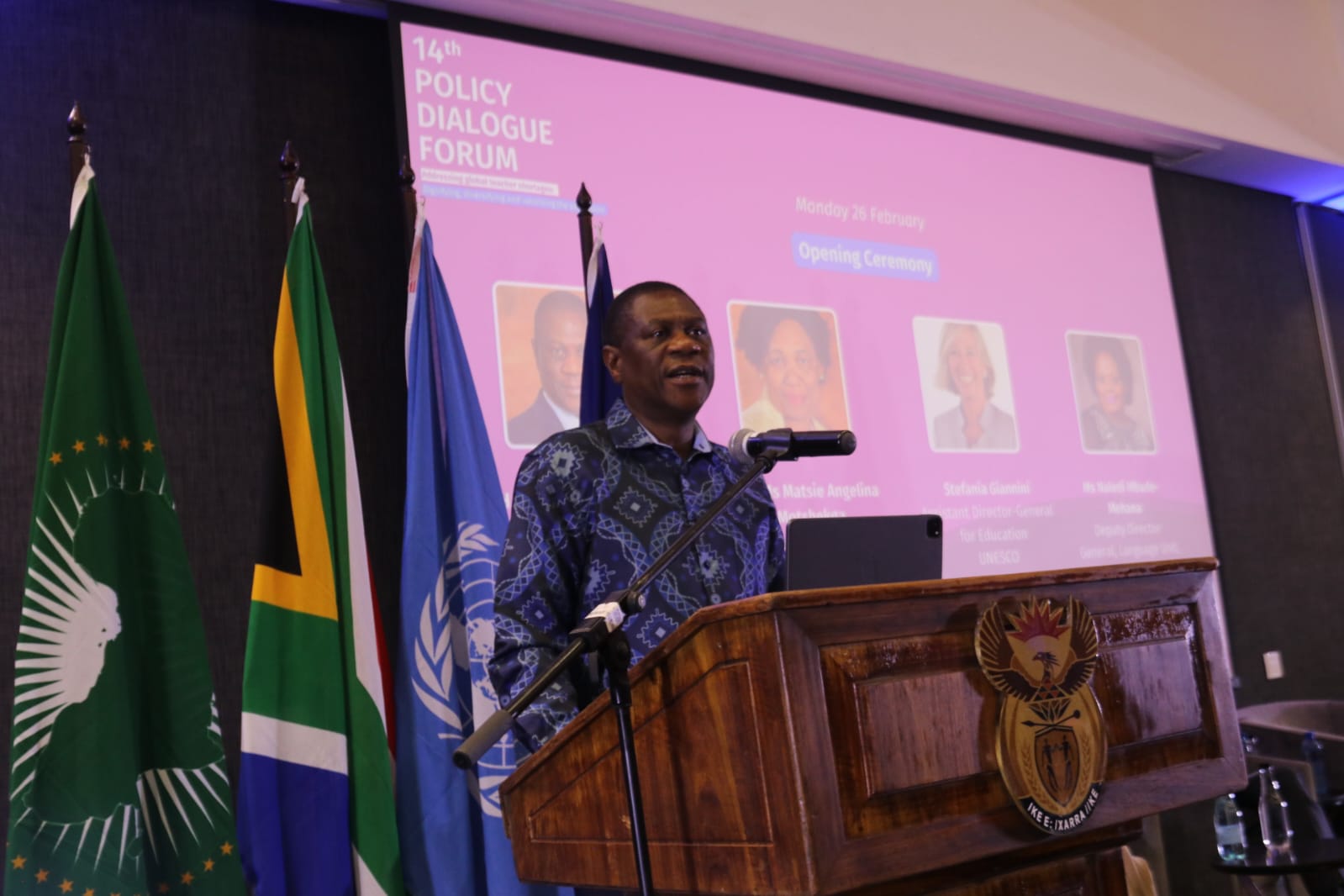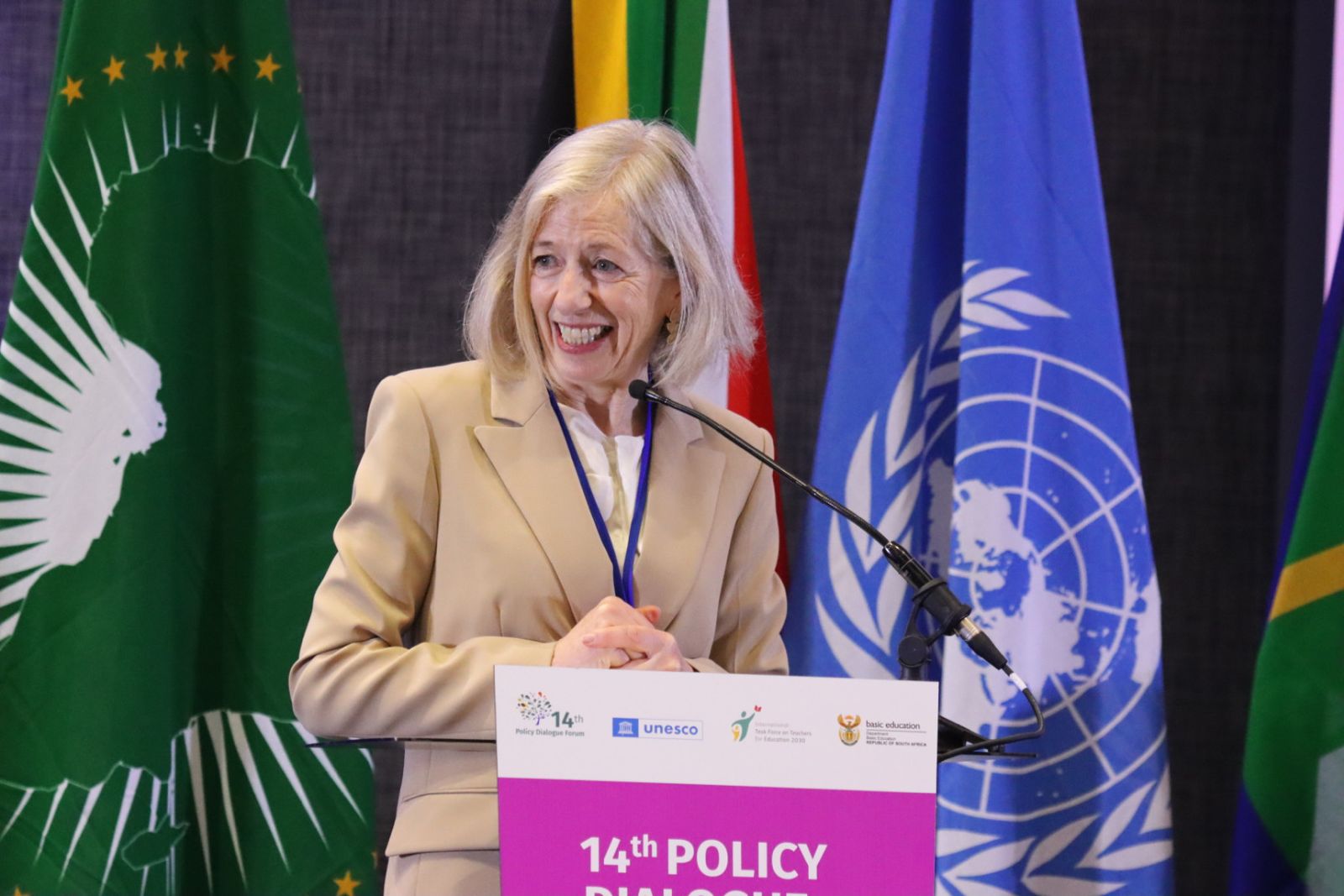This article has been jointly authored by the Teacher Task Force and the Department of Basic Education of South Africa, following the 14th Policy Dialogue Forum which took place on 26-29 February 2024 in Johannesburg, South Africa.
On behalf of the South African Government, the Department of Basic Education, UNESCO and the International Task Force on Teachers for Education 2030 (Teacher Task Force) jointly hosted approximately 400 participants from across the globe, attending the 14th Policy Dialogue Forum (PDF) from 26 to 28 February.
Education stakeholders from around the world gathered in Johannesburg for the Teacher Task Force's 14th Policy Dialogue Forum, themed; "Addressing teacher shortages: Dignifying, diversifying, and valorizing the profession." The Forum brought together policymakers, educators, and renowned experts to tackle one of the most urgent challenges facing education systems worldwide.
Acknowledging the crucial role of educators
During the official opening address, Deputy President of South Africa, Mr. Paul Mashatile expressed gratitude to the International Task Force on Teachers for Education 2030, “for recognising South Africa as a key player in the journey to achieving quality education for all by the year 2030.” Furthermore, he expressed the need for the crucial role of educators to be acknowledged.
“We need to acknowledge the inherent worth of teachers and the crucial role they play in shaping the future of our nations. Beside teaching and imparting knowledge to the future generation, teachers play a crucial role in nurturing, fostering critical thinking, inspiring dreams, and pushing the limits of human potential. We thus owe it to these titans of our society to recognise, honour, empower, and value them, as well as the job that they do.

"Most importantly, significant consideration must be made on how we should improve their working conditions and remuneration as a way of appreciating their hard work, so that they can be able to fulfil their important task without getting discouraged," said Deputy President, Mr. Paul Mashatile.
In her address to the Forum, Ms. Stefania Giannini, UNESCO’s Assistant Director-General for Education spoke on the importance of the Forum achieving its goals of making learning and teaching accessing and appealing for both educators and learners.
"The 14th Policy Dialogue Forum represents a pivotal moment for collaborative action in tackling global teacher shortages. As we gather to exchange knowledge and drive impactful solutions, this forum underscores our collective commitment to strengthening education systems worldwide, ensuring every learner has access to a qualified, motivated, and well-supported teacher," said Ms. Stefania Giannini, UNESCO’s Assistant Director-General for Education.

A roadmap for transforming the teaching profession
The first day of the Forum featured the official launch of the Recommendations of the United Nations Secretary-General’s High-Level Panel on the Teaching Profession, which sets out the roadmap for transforming the teaching profession and meeting the needs of the future.
Following the opening remarks by the Deputy President of the Republic of South Africa, H.E. Mr. Paul Mashatile, the Deputy Secretary-General of the United Nations, Ms. Amina Mohammed, South Africa’s Minister of Basic Education, H.E. Ms. Matsie Angelina Motshekga, and UNESCO’s Assistant Director-General for Education, Ms. Stefania Giannini, the Forum assembled into breakaway sessions for further deliberations.
A milestone report on addressing teacher shortages
Central to the Forum's agenda was the launch of the Global Report on Teachers produced by UNESCO and the Teacher Task Force. Revealing the need for an additional 44 million teachers to reach universal primary and secondary education by 2030, the report underscores the urgency of the teacher shortage crisis. This landmark report with new data, including on financing the profession, not only sheds light on the subject but also proposes actionable strategies to enhance the teaching profession.
A ministerial panel on dignifying, diversifying, and valorizing the teaching profession
A highlight of the day was a ministerial panel moderated by distinguished speakers from various Member States, including from South Africa, China, Ecuador, Ghana, and Finland, as well as the African Union. The panel delved into strategies for dignifying, diversifying, and valorizing the teaching profession.
A unique opportonity for collaboration and knowledge-sharing on effective teacher policy-making
Across three days of plenaries and discussions, this unique global Forum on effective teacher policy-making is also providing a platform for networking and side events of the world’s most prominent actors on teachers and teaching. Fostering collaboration and exchange of best practices, and promoting international cooperation to address global teacher shortages and to make the teaching profession more attractive, the Forum is a pivotal event which highlights the key role of South Africa in the region.
A full summary report on the outcomes of the Forum will be published here shortly.
A resource pack will also be available here soon, featuring, among other assets, the presentations given during the Forum.
For more information:
- 14th Policy Dialogue Forum event page
- Global Report on Teachers: Addressing teacher shortages and transforming the profession
- Recommendations of the High-Level Panel on the Teaching Profession
- South Africa Department of Basic Education
For media inquiries:
Teacher Task Force: Anna Ruszkiewicz, ae.ruszkiewicz@unesco.org
South Africa Department of Basic Education: Elijah Mhlanga, Chief Director Communications, Mhlanga.e@dbe.gov.za